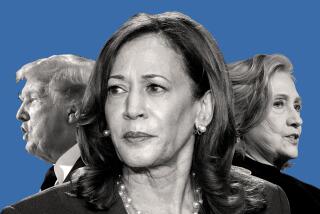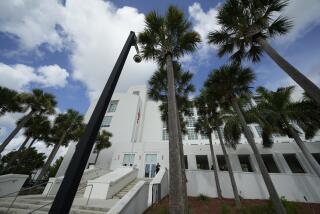NEWS ANALYSIS : Low Key but Strong Start for Bailey Seen
- Share via
In the evanescent argot of the Simpson phenomenon, the question of the moment is: Does F. Lee Bailey still have his fastball?
Right ballpark. Wrong metaphor.
Cross-examination rarely depends on speed. Usually, it calls for junk--curves, sliders, change-ups and, if you’re clever enough, the occasional spitter. They’re the sort of pitches that flirt, dance and deceive before they hit the catcher’s mitt with the thud of awful finality.
In other words, forget Nolan Ryan; think Phil Niekro.
And, as Detective Mark Fuhrman may yet discover, when it comes to throwing junk, 61-year-old defense attorney Bailey still has a lot of stuff, many legal analysts say. Though the onetime legal celebrity generally has labored out of the public eye for the past decade, he and his Boston-based partner Kenneth J. Fishman have handled complex homicides, including a double murder in that city just last year. In that case, Bailey’s cross-examination of the prosecution’s eyewitness won his client an acquittal, even though his co-defendants, who were tried separately, were convicted.
Some, including Fuhrman’s personal lawyer, have suggested that Bailey is a has-been simply seeking to use the murder trial of O.J. Simpson to revive a reputation that has gone into eclipse.
But since 1985, Bailey’s firm has handled eight homicide trials or appeals. In two cases the defendants were acquitted and in two others they were convicted. One appeal ended in a reversal for insufficient evidence and in three others new trials have been granted.
“Lee is an extraordinary lawyer and without peer in many areas,” said Boston attorney Joseph Balliro, who was Bailey’s co-counsel in the 1962 Plymouth mail robbery case. At the time, the multimillion-dollar theft was the largest postal crime in U.S. history. It was one of Bailey’s first cases to attract national attention and, ultimately, all four defendants were found not guilty.
“His skills at cross-examination are legendary. That’s partially a result of his almost photographic memory. In most instances, even without taking notes, he is able to recall almost everything needed to do effective cross-examination,” Balliro said.
Monday, the consensus among defense lawyers was that Bailey was off to a low-key but strong start in his interrogation of Fuhrman, the LAPD detective who discovered a bloody glove on Simpson’s estate matching one at the murder scene.
Los Angeles attorney Barry Tarlow, who once cut his Boston University Law School classes to cross the street and watch Bailey try cases, was, like attorneys across the country, tuned in as Bailey took center stage. “Without question Bailey is the greatest lawyer of the second half of the 20th century,” Tarlow said, reminiscing. “His cross-examinations have been brilliant. I have never seen anyone with the ability to dominate a courtroom in the manner that Lee Bailey did. He had a tremendous physical presence, a voice and a total command of the facts in the cases he was involved in. The total package was far beyond anything I’ve ever seen since.
“I spent time with him last Thursday night, and he told me he’s ready to rumble. I am convinced he is still exceptional, and is going to do an excellent job in cross-examining Fuhrman.”
Still, Tarlow said, “it’s only on ‘Perry Mason’ that you see someone break down and admit, ‘You’re right, counselor, I planted the glove.’ In spite of Bailey’s skill, an experienced and skilled witness like Fuhrman doesn’t fold on the stand.”
The defense hopes to persuade the jury that Fuhrman, motivated by racism and a hatred of interracial couples, planted the bloody glove to implicate Simpson in the murder of his ex-wife and her friend--a suggestion that Fuhrman and the prosecution vigorously deny.
To Miami defense attorney Roy Black, Monday’s exchange between Bailey and Fuhrman was “like a championship fight. During the first round, the fighters are feeling each other out. Bailey is looking for Fuhrman’s weak spots. Bailey scored a point when he floated the theory for the first time that the glove was used to plant the blood in the Bronco. But, all in all, I thought Fuhrman came off pretty well.”
Defense lawyer Gerald L. Chaleff had a more positive impression of Bailey’s performance Monday, though he, too, sounded a note of caution. “What Bailey did Monday is what good lawyers do,” Chaleff said, “which is to pin witnesses down. For the most part, he was non-confrontational. But he is skillfully pinning Fuhrman down to a single version of what happened.
“Everybody thinks cross-examination has to be spectacular, but it doesn’t. Sometimes it just has to be thorough. The real point here is: Can Bailey prove what you’re suggesting? Is there a credible witness to impeach Mark Fuhrman? All the theatrics in the world cannot overcome a lack of evidence.”
Santa Monica defense attorney Gigi Gordon said she could detect a vital subtext in Bailey’s questions Monday. “I know where Bailey is going now,” she said. “He is an astute observer of human nature and he has found the flaw in Fuhrman’s character. It isn’t racism--though he may yet prove that--it’s the sin of pride.
“Bailey is going to develop this sense of frustration and even petty spitefulness Fuhrman felt about being pulled off the case. He’ll use that to create a crescendo of doubt about where that jealousy may have led Fuhrman.”
Monday’s encounter with Fuhrman was Bailey’s first star turn so far in the Simpson case. Up to now, he has argued a few motions and questioned a minor witness, Sgt. David Rossi. Many legal experts felt that Bailey’s histrionic approach in that instance was over the top.
Former federal prosecutor David P. Bancroft, now a white-collar defense lawyer in San Francisco, said Bailey has sometimes taken his cross-examinations too far. “Lee makes a wonderful courtroom presentation. He conducts cross-examination vigorously and with dramatic impact,” he said.
But after Bailey unsuccessfully defended kidnaped heiress Patricia Hearst in her 1976 bank robbery trial, “there were some jurors who commented that he went too far in aggressively cross-examining some of the government psychiatrists,” Bancroft said. “The jurors thought his questions were mean-spirited. The difficulty is that one man’s mean-spiritedness is another man’s aggressive search for the truth. You never know how a jury will react. Bearing down and boring in has its risks.”
One place where Bailey is bound to bear down and bore in is on the question of Fuhrman’s racial attitudes. Though Superior Court Judge Lance A. Ito rejected Bailey’s request Monday that he reconsider the scope of permissible questioning on that topic, defense attorney Gordon thinks the issue is far from over.
“Ito thinks he’s slammed the door on that,” she said, “but Bailey will come in through the keyhole like smoke. Ito can’t stop him. He may hold him off for a couple of days. But sooner or later, it’s coming in.”
Times researcher Cecilia Rasmussen contributed to this story.
More to Read
Go beyond the scoreboard
Get the latest on L.A.'s teams in the daily Sports Report newsletter.
You may occasionally receive promotional content from the Los Angeles Times.










